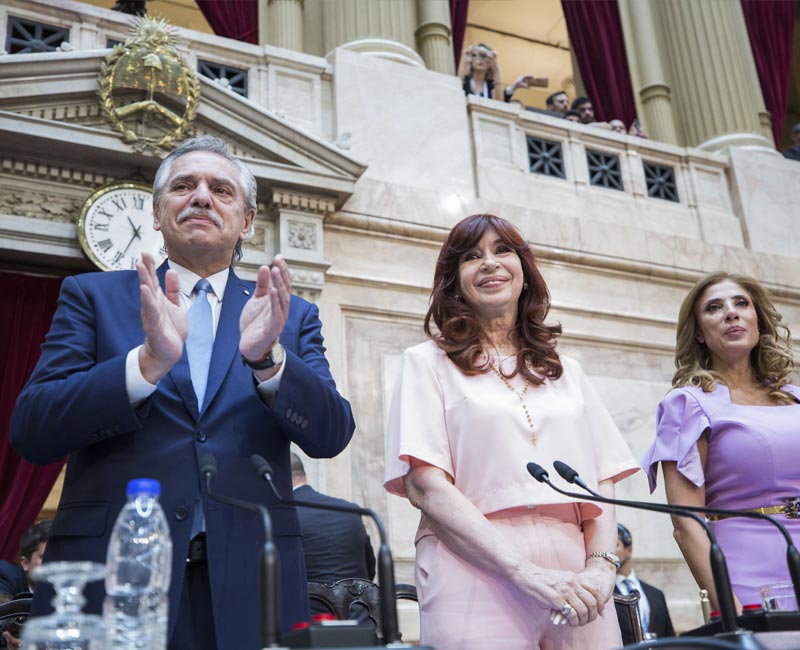
El Presidente prometió seguir luchando para bajar la inflación, pronosticó que la economía seguirá creciendo y destacó la producción de energía.
El presidente Alberto Fernández destacó que su gobierno trabaja para reducir la inflación y el déficit fiscal, que la economía sigue creciendo y ponderó las obras destinadas a hacer crecer la producción energética de la Argentina.
Al hablar ante la Asamblea Legislativa, Fernández dijo que la Argentina será uno de los países que más crecerá el año próximo.
El jefe de Estado aseguró que la Argentina es “uno de los países que más creció en estos dos últimos años” y auguró que el país volverá a crecer este año.
“A pesar de los cataclismos tantas veces anunciados, continuamos ordenando nuestra economía”, aseguró.
“Todas las proyecciones propias y de los organismos internacionales señalan que en 2023 volveremos a crecer. Seremos uno de los países que más crezca del mundo y de los primeros de la región. Serán tres años consecutivos de crecimiento de nuestra producción, algo que no sucedía desde el 2008”, destacó.
Dijo que “no hay solución a nada si la economía no crece. Por supuesto que debemos distribuir mejor nuestra generación de riqueza, pero es fundamental sentar las bases para el crecimiento equilibrado”.
“Si no crecemos, no hay nada para distribuir. Si crecemos sin políticas activas de distribución, la riqueza se concentra en pocas manos. En ese clivaje es donde tiene que asentarse un Estado inteligente y eficiente”, afirmó.
Al hablar ante la Asamblea Legislativa, Fernández dijo que “si crecimos y generamos más empleo, más inversión y más consumo fue porque adoptamos desde el Estado políticas activas. Desde la preservación de empresas y de empleo durante la pandemia hasta las actuales políticas que estimulan la producción y las exportaciones, las que promocionan líneas de créditos y las que buscan acuerdos entre las partes en todos los sectores productivos”.
Fernández destacó que la Argentina es “uno de los países que más creció en estos dos últimos años” y auguró que el país volverá a crecer este año.
“Todas las proyecciones propias y de los organismos internacionales señalan que en 2023 volveremos a crecer. Seremos uno de los países que más crezca del mundo y de los primeros de la región. Serán tres años consecutivos de crecimiento de nuestra producción, algo que no sucedía desde el 2008”, subrayó.
Dijo que “no hay solución a nada si la economía no crece. Por supuesto que debemos distribuir mejor nuestra generación de riqueza, pero es fundamental sentar las bases para el crecimiento equilibrado”.
“Si no crecemos, no hay nada para distribuir. Si crecemos sin políticas activas de distribución, la riqueza se concentra en pocas manos. En ese clivaje es donde tiene que asentarse un Estado inteligente y eficiente”, afirmó.
Fernández dijo que “si crecimos y generamos más empleo, más inversión y más consumo fue porque adoptamos desde el Estado políticas activas. Desde la preservación de empresas y de empleo durante la pandemia hasta las actuales políticas que estimulan la producción y las exportaciones, las que promocionan líneas de créditos y las que buscan acuerdos entre las partes en todos los sectores productivos”.
Datos positivos sobre la economía
Fernández destacó que la economía “volvió a crecer durante 2022 y registró un aumento de 5,4%. De este modo, sumamos más crecimiento al 10,3% que se registró durante el 2021”.
“En 2022 la actividad industrial creció 4,5% respecto a 2021, y muestra un crecimiento del 12,1 % en la comparación con 2019. La industria encadenó 15 meses de subas continuas y el empleo industrial alcanza el nivel más alto desde junio de 2018, acumulando 29 meses consecutivos de expansión, registrando más de 86 mil nuevos puestos de trabajo con relación a diciembre de 2019”, señaló.
Dijo que “en la industria automotriz, por ejemplo, se observó en 2022 un incremento del 23,4% en relación al 2021 y de 70,5% respecto al 2019. Es el más alto desde 2015. Las estimaciones del sector proyectan para 2023 un crecimiento del orden de entre el 10 y el 15% en la producción”.
“En el sector de prendas de vestir, cuero y calzado, a noviembre de 2022 se registró la vigésima primera suba interanual consecutiva con una producción 45,8% más alta que en 2019.
Para el mismo mes (noviembre de 2022) la Siderurgia registró un incremento de 28,4% respecto a 2019. La producción de alimentos es 13,1% mayor que en 2019 y la de Maquinarias y Equipos 45,6% por encima del 2019″, indicó.
Señaló que “en 2022 el consumo interno de cemento totalizó 12,8 millones de toneladas. Se expandió 7,3% en comparación con el año anterior y 17,1% frente a 2019. De esta manera, el consumo acumulado del año fue el mayor desde 2004”.
Destacó que “la recuperación también fue muy fuerte en las pymes industriales, con la utilización de la capacidad instalada industrial y la rentabilidad industrial Pyme en su mayor nivel en más de 3 años.
En cuanto al sector agropecuario, el año cerró con las preocupaciones que genera una sequía muy severa que en mayor o menor medida viene afectando la producción de trigo, cebada, soja y maíz. Ante estas dificultades climáticas, el Estado ha dispuesto un conjunto de instrumentos para apoyar a los productores más afectados, como lo hacemos con todos los sectores de nuestra economía. No obstante, las exportaciones del sector durante 2022 fueron récord”.
Ponderó que “se produjeron más de 142 millones de toneladas de cereales, oleaginosas y otros cultivos. En la campaña 2021-2022 el área sembrada fue superior a los 42 millones de hectáreas, un récord histórico. También se registró crecimiento productivo, en carne bovina y porcina, que alcanzó niveles nunca antes visto”.
The economic keys to Alberto Fernandez’s speech in Congress
The President promised to continue fighting to lower inflation, predicted that the economy will continue to grow and highlighted energy production.
President Alberto Fernández highlighted that his government is working to reduce inflation and the fiscal deficit, that the economy continues to grow and praised the works aimed at increasing Argentina’s energy production.
Speaking before the Legislative Assembly, Fernández said that Argentina will be one of the countries that will grow the most next year.
The head of state assured that Argentina is “one of the countries that grew the most in these last two years” and predicted that the country will grow again this year.
“In spite of the cataclysms so many times announced, we continue to order our economy”, he assured.
“All our own projections and those of international organizations point out that in 2023 we will return to growth. We will be one of the fastest growing countries in the world and one of the first in the region. It will be three consecutive years of growth in our production, something that has not happened since 2008,” he said.
He said that “there is no solution to anything if the economy does not grow. Of course we must distribute our wealth generation better, but it is essential to lay the foundations for balanced growth.”
“If we do not grow, there is nothing to distribute. If we grow without active distribution policies, wealth is concentrated in a few hands. It is in that cleavage where an intelligent and efficient State has to settle,” he said.
Speaking before the Legislative Assembly, Fernández said that “if we grew and generated more employment, more investment and more consumption, it was because we adopted active policies from the State. From the preservation of companies and employment during the pandemic to the current policies that stimulate production and exports, those that promote credit lines and those that seek agreements between parties in all productive sectors”.
Fernández highlighted that Argentina is “one of the countries that grew the most in the last two years” and predicted that the country will grow again this year.
“All our own projections and those of international organizations point out that in 2023 we will grow again. We will be one of the fastest growing countries in the world and one of the first in the region. It will be three consecutive years of growth in our production, something that has not happened since 2008,” he stressed.
He said that “there is no solution to anything if the economy does not grow. Of course we must distribute our wealth generation better, but it is essential to lay the foundations for balanced growth.”
“If we do not grow, there is nothing to distribute. If we grow without active distribution policies, wealth is concentrated in a few hands. It is in that cleavage where an intelligent and efficient State has to settle,” he said.
Fernandez said that “if we grew and generated more employment, more investment and more consumption, it was because we adopted active policies from the State. From the preservation of companies and employment during the pandemic to the current policies that stimulate production and exports, those that promote credit lines and those that seek agreements between the parties in all productive sectors”.
Positive data on the economy
Fernandez highlighted that the economy “returned to growth during 2022 and registered an increase of 5.4%. Thus, we add more growth to the 10.3% that was recorded during 2021.”
“In 2022, industrial activity grew 4.5% compared to 2021, and shows a growth of 12.1% in the comparison with 2019. The industry chained 15 months of continuous rises and industrial employment reaches the highest level since June 2018, accumulating 29 consecutive months of expansion, registering more than 86 thousand new jobs compared to December 2019”, he said.
He said that “in the automotive industry, for example, an increase of 23.4% was observed in 2022 compared to 2021 and 70.5% compared to 2019. This is the highest since 2015. Industry estimates project for 2023 a growth in the order of 10-15% in production.”
“In the apparel, leather and footwear sector, as of November 2022, the twenty-first consecutive year-on-year rise was recorded with production 45.8% higher than in 2019.
For the same month (November 2022), Iron and Steel recorded an increase of 28.4% over 2019. Food production is 13.1% higher than in 2019 and Machinery and Equipment 45.6% above 2019,” he said.
He noted that “in 2022, domestic cement consumption totaled 12.8 million tons. It expanded 7.3% compared to the previous year and 17.1% compared to 2019. Thus, cumulative consumption for the year was the highest since 2004.”
He highlighted that “the recovery was also very strong in industrial SMEs, with industrial installed capacity utilization and industrial SME profitability at its highest level in more than 3 years.
As for the agricultural sector, the year closed with the concerns generated by a very severe drought that to a greater or lesser extent has been affecting the production of wheat, barley, soybean and corn. In view of these climatic difficulties, the State has made available a set of instruments to support the most affected producers, as we do with all the sectors of our economy. Nevertheless, the sector’s exports during 2022 were record”.
He pondered that “more than 142 million tons of cereals, oilseeds and other crops were produced. In the 2021-2022 campaign, the sown area was over 42 million hectares, a historical record. There was also growth in beef and pork production, which reached levels never seen before”.





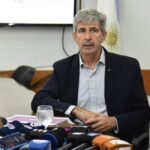
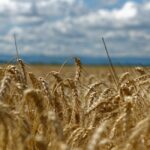


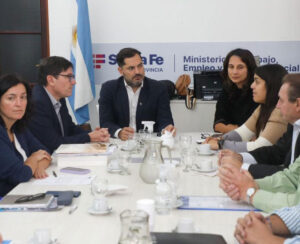
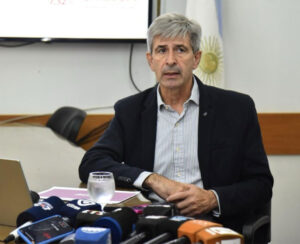
Noticias relacionadas
Embajador israelí en la Argentina agradeció el apoyo de Javier Milei
Argentina cerró todas sus embajadas en Medio Oriente
Causa seguros: Ercolini rechazó que el Gobierno sea querellante porque podría haber más funcionarios implicados